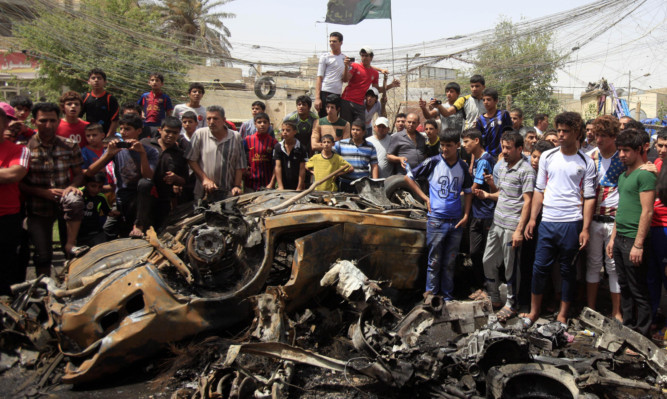Two car bombs have exploded in sprawling Shiite neighbourhoods of the Iraqi capital killing at least 12 civilians and wounding 30, officials said.
The first blast struck a bus and taxi stop around rush hour in the eastern Sadr City. Among the nine killed was a seven-year old child, and 16 people were wounded.
Another car bomb hit a small market at a taxi stop in the eastern suburb of Kamaliya, killing three civilians and wounding 14 others.
The attack followed a wave of bombings yesterday that struck in mainly in Shiite areas, killing 33 people. At least seven of them died in Sadr City when a bomb in a parked car detonated at a bus stop.
The spike in violence comes amid growing tensions between the Shiite-led government and Iraq’s Sunni minority over what they consider second-class treatment. A bloody government crackdown on militants last month in a protest camp in the country’s north fueled the tension.
Iraq’s embattled Shiite Prime Minister Nouri al-Maliki blamed sectarian tension for the latest attacks.
“We have to know that today’s bloodshed is the result of sectarian hatred and also the result of a stirring up of these sectarian tensions,” Mr al-Maliki said at a government conference addressing atrocities committed under dictator Saddam Hussein. Incitement could be coming from inside or outside the country, he added.
No one immediately claimed responsibility for the attacks, but car and suicide bombings are a hallmark of al Qaida’s Iraq branch.
The spike in attacks, after a general decrease in violence, has raised fears of a return to the sectarian bloodshed that pushed the country to the brink of civil war in 2006-2007. Shiite militias have so far been largely restrained in their reactions to such bombings.
AP ldren or someone disabled or with a long-term illness, in fuel poverty also fell, according to the 10% measure.
Energy and Climate Change Minister Greg Barker said: “I am very encouraged by this modest fall in the number of households living in fuel poverty.
“But there is absolutely no room for complacency. There is still an unacceptably high number of people living in cold, damp, unhealthy conditions.
“However after years of year-on-year growth in the number of fuel-poor households we are starting to make progress, but the coalition Government is determined to do even more.
“While we can’t control volatile international energy prices, which always have the potential to undermine progress, it is clear that our determined focus on improving home energy efficiency is proving a highly effective weapon in this battle.”
